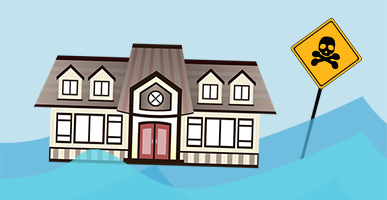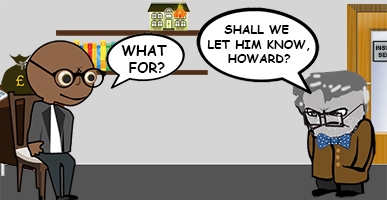
Quick Links
Surprisingly, Landlord insurance isn’t a legal requirement. And yes, that is particularly mind-boggling considering some of the bogus regulations that do exist; enforcing insurance by law would actually make sense. But I digress.
So while you can legally let out a property without any form of insurance, the reality is, the risk of opting to go without suitable coverage is, quite frankly, bonkers! Moreover, I’d seriously have to question the mental state of anyone that dares to run that kind of risk. It may not be a legal requirement, but I’d argue that having adequate insurance is essential for all landlords.
The only dilemma is, with so many types of landlord insurances to choose from, it can seem like a bit of a minefield.
So, let’s dance through some of the need-to-knows, including your options…
Page contents
Get a quick Landlord Building and/or Contents Insurance quote
If you have absolutely no desire to learn the theory (maybe because you know it already), and you simply want me to recommend a landlord insurance provider, then I’m going to point you in the direction of QuoteSearcher. I’ve successfully used (and subsequently partnered with them) for several years now, which is why I don’t hesitate when it comes to recommending their services.
If you slap the ‘quote’ button below, you will be directed to a landlord insurance form. After completion, a specialist broker will contact you to run through your requirements and the options available. There is no obligation and receiving the quotes is 100% free.
Types of landlord insurance products
There was a time when “Landlord Insurance” was a relatively simple process, you either opted for a policy that covers the building against damages or one that covers both the building and the internal contents (e.g. furniture). Simply, “Building insurance” or “Building & contents insurance”
Typically, landlords with furnished properties opt for building and contents cover, while everyone else heads towards the bog-standard building cover. Easy-peasy.
Those options are still available, and they’re still undoubtedly the most common policies landlords opt for.
However, in today’s thriving BTL market – where many of us are in the line of fire more than ever before (for various reasons) and consequently require more protection – there’s a lot more on offer!
Below I’ve listed a range of insurance products available, or at least, the ones I feel every landlord should be aware of.
Landlord insurance policies are very much like any other type of insurance in the sense that the sky’s the limit; you have the option to apply a bunch of add-ons for extra protection. It really boils down to how much protection you want and how much cash you’re willing splash in order to hedge your bets against varying disasters.
Now you’re probably wondering how much cheese we’re talking here, and so you should. Don’t worry, I’ve got you covered (just not right here). You can get a better idea of how much it costs to be armoured up to the gills in another blog post that covers the cost of landlord insurance in more detail, as the focus here is to only give you a better idea of what types of landlord insurances are available.
It’s also worth noting that it’s unlikely you’ll be able to get ONE insurance policy from one provider that will cover every type of landlord insurance available listed below (because some are specialist products). However, what you will be able to do is get multiple policies (from either the same provider or a few different ones) that will be able to cover the spread of protection that you require. For example, I usually purchase building insurance from a different provider than rent protection insurance.
1) Landlord/BTL Building Insurance
Even though there are several types of insurances available for landlords, the term “landlord insurance” usually refers to building insurance, and that’s because it’s the most important out of the lot. It’s the bare minimum coverage every landlord should have.
Landlord building insurance covers the cost of repairing the structure of a rental property in the event of damage caused by an “insured event”, which usually includes fire, weather damage, subsidence, burst pipes, theft and vandalism.
There are hundreds of policies available on the market, and new ones are being introduced regularly, so it’s critical to carefully pick a policy that best suits your specific circumstances, ensuring to avoid over or under insuring.
An insurance broker should be able to provide assistance and guidance when it comes to choosing a suitable policy. You can talk to a broker today, by filling in this quote form (there are no obligations and it’s completely free)!
For more information, go to the Landlord Building & Content Insurance Guide.
2) Landlord Contents Insurance
As mentioned, Landlord building insurance is considered essential, but the same isn’t typically said about “contents” cover, even though it’s incredibly popular. Whether it’s suitable for you generally depends on the contents of the property you’re renting out.
If your property is “furnished” then it’s worth considering contents insurance, because it will cover the financial cost of repairing or replacing any household furnishings, white goods (cooker, oven, fridge, freezer etc.) and personal possessions.
If the property is unfurnished, then it’s ultimately down to the tenant to get their own suitable Tenants Contents Insurance policy to cover their personal belongings. Landlords are NOT obligated to insure their tenants’ possession.
Content insurance is often purchased with building insurance as part of the same policy provided by the same insurer, so you don’t need to get them separately if you require both. However, that doesn’t have to be the case, you can get separate policies (although, I’m not sure that makes much sense, because it’s usually cheaper to get them both together from the same provider).
For more information, go to the Landlord Building & Content Insurance Guide.
3) Rent Guarantee Insurance (RGI)
This type of insurance protects landlords against loss of rent in the event of a tenant falls into arrears.
In this unfortunate event, RGI protection will cover the rent for an extended period of time, or at least a percentage of it, depending the policy.
Personally, I’m a massive fan of rent protection insurance, because it’s a relatively cost-effective policy that can easily save landlords thousands in the unforeseen event of incurred rent arrears and legal fees (which sadly, happens all too often). Other landlords clearly share the same sentiment, because it’s become a wildly popular insurance policy.
For more information on RGI, go to the Landlord Rent Guarantee Insurance (RGI) Guide.
4) Loss of Rent Insurance
NOT be confused with RGI, although it’s easy to understand how it often is.
Loss of rent protection covers loss of rental income in the event that the property becomes uninhabitable due to an insured event (e.g. fire, flood, explosion, vandalism etc.), forcing the tenant to find alternative accommodation. It does NOT guarantee rent in the event of rent arrears.
Loss of rent protection is often found included as standard with broader landlord insurance policies (e.g. building insurance) or is available as an optional add-on. Unless RGI, I’ve never seen loss of rent cover available as a standalone product.
For more information on loss of rent protection (and how it differs from RGI), go to the Landlord Loss of Rent Insurance Guide.
5) Landlord Boiler Cover & Insurance
Boilers are arguably the most important and expensive appliance to maintain in a BTL rental property, which is why landlords are keen to get boiler coverage.
Landlord boiler cover is designed to specifically cover the boiler and central heating systems, the plans usually include boiler & central heating repairs, boiler servicing, gas safety inspection (this is legally required by landlords), emergency callouts etc.
Plans start from about £15 per month, but it’s worth noting that an annual gas safety inspection (CP12 Certificate) alone is worth approximately £70.
For more information and available suppliers, go to the Landlord Boiler Cover & Insurance Guide.
6) Landlord Maintenance & Home Emergency Cover
These are relatively new products, but you’ve quickly gathered momentum due to the major convenience they can provide landlords.
This type of insurance covers all aspects of home maintenance, including boilers, heating, plumbing, electrics, and more. These plans are effectively a comprehensive version of the boiler care plans, as they all generally include them.
You may have seen British Gas heavily advertise their landlord home emergency plan on TV – they’ve been recruiting hard.
Essentially, you pay in the region of £15 per month, and British Gas (or whoever is providing the cover) will attend to your “emergency” promptly, including within 24 hours depending on the severity.
One call out alone can cover the cost of an annual policy.
For more information and available suppliers, go to the Landlord Maintenance & Home Emergency Cover Guide.
7) Landlord White Goods & Appliance Insurance
Similarly to maintenance insurance, white goods and appliance insurance is one of those niche policies that’s starting to gain momentum amongst landlords.
It’s pretty self-explanatory, but essentially this kind of insurance policy protects appliances throughout your rental property(ies) against breakdowns and accidental damage. This can include all major white goods, such as washing machines, fridge, freezer, dishwasher, tumble dryer, microwave etc. If they can’t repair it, they’ll replace it.
Many of the policies available will insure an unlimited amount of white goods of any age.
A particularly useful solution for those landlords that don’t live local to their rental property(ies), or if there’s a history of excessive cost on replacing or repairing appliances.
For more information and recommended suppliers, go to the Landlord Appliance & White Goods Insurance Guide.
8) Legal Cover/Protection
Landlord legal protection covers landlords for legal expenses that may incur during a tenancy. For example, often when landlords deal with tenants that have fallen into rent arrears, the legal expenses to evict the tenant can amount to a considerably amount, especially when reluctant tenants drag their feet. Those fees can be recovered with this type of insurance.
Legal cover is commonly included with many standard landlord insurance policies (i.e. with building insurance coverage). If it’s not, it can usually be purchased as an “add-on” extra for approx. £40.
Most RGI insurance policies also include legal cover (it’s usually part of the overall package).
9) Public liability Insurance
Public liability cover typically comes included with most insurance policies, however, it’s better to be made aware of what it means so you can ask the question when you’re getting your insurance policy.
The public liability schedule refers to being insured for accidental injuries incurred by your tenants within the confinement of your property e.g. if they suffer any injuries from a nasty fall down the stairs.
Since the UK is becoming ever more litigious, every landlord should have public liability insurance to cover themselves. Tenants are becoming much more savvy about getting “no win, no fee” solicitors involved (it’s pretty sad, but everyone wants that easy buck)!
It’s always worth checking to see if your policy covers public liability.
Do I need landlord insurance?
Currently, there is no legal requirement for UK residential landlords in England or Wales to have any form of insurance policy. Most policies are available to provide ease and reassurance, nothing more. However, in all honesty, you’d have to be a complete and utter fool not to at least have a building insurance policy.
It really doesn’t make any sense not to have a BTL building insurance policy.
The maths is simple: pay approximately £150 a year for insurance, or stand to lose your entire investment by an accidental fire.
Not to mention, you’ll still be liable to pay the mortgage. imagine how demoralising that would be, paying off debt for a pile of burnt rubble.
Buy-to-let properties are large investments, probably your biggest investment, so you should be protecting your money from unexpected dilemmas (which sadly, occurs more frequently than we’d like to think).
Assess your needs and get the insurance policy(ies) you feel necessary. There’s a lot to be said about feeling at ease when you know you’re armed to the teeth with adequate insurance.
Quick and easy Landlord Insurance quotes
If you’re interested in getting landlord insurance, then I would highly recommend talking to an insurance broker. Not only will they provide you with specialist advice, but you’ll also get access to the best products on the market at the most competitive rates. There is no obligation and receiving the quotes won’t cost you a penny, it’s 100% free.
If you click on the link below, you will be directed to a landlord insurance form, where you can compare some of the best quotes around by talking to specialised brokers! I recently renewed my landlord Insurance policy by using the quote form and saved £260 and it only took 20 minutes to get everything up and running.
Even if you currently have a policy, it’s well worth shopping around and preparing yourself for when your current one is due to expire, because it’s an incredibly competitive market.
Top tips for buying your landlord insurance
- Read and understand all the terms and conditions in your proposed policy. Often the cheapest isn’t always the best suited for your circumstances, and that’s especially true with insurance! If there are any details you are unsure about, ask your policy provider for clarity.
- Make sure your policy is suited for your specific circumstances so you avoid over or under insuring.
- Check if your policy requires you to pay an excess fee with any claims, and check the amount. Generally speaking, policies with higher excess fees have a lower premium.
- Get written confirmation of any discussed details that are not specifically written in your policy, which you feel could come under scrutiny and impact future claims.
- If any circumstances change through an existing policy (e.g. you build an extension or there is a change in tenancy), you should contact your insurance provider immediately to update their records. Otherwise they may refuse any future claims.
- Auto-renewing or remaining loyal to your existing insurance provider is often the most expensive way to renew insurance products. Always shop around to get new quotes before your current policy is due to expire. Often, your current provider will even match your best quote (as long as it’s a like-for-like product), even if their initial renewal quote was significantly more expensive.
- Don’t forget, landlord insurance is tax deductible :)
Disclaimer: I'm just a landlord blogger; I'm 100% not qualified to give legal or financial advice. I'm a doofus. Any information I share is my unqualified opinion, and should never be construed as professional legal or financial advice. You should definitely get advice from a qualified professional for any legal or financial matters. For more information, please read my full disclaimer.


 Landlord Products / Services
Landlord Products / Services


















